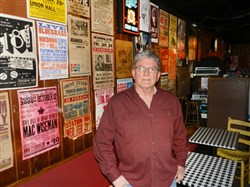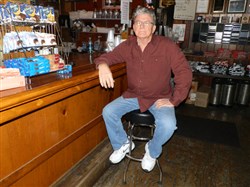VOL. 38 | NO. 45 | Friday, November 7, 2014
Station Inn: Music history amid Gulch high-rises
J.T. Gray – who pioneered smokeless nightclubs before it became fashionable (and/or mandated) – is glad to see sparkling condo towers, office buildings, restaurants and the like sprouting around him. After all, these newcomers eventually might find themselves inside his time-out-of-mind blockhouse where Bill Monroe used to just drop by and pick.
”We’re celebrating our 40th year with some special bands in December,” says J.T., 68, who bought The Station Inn in 1981 after it had been through a fistful of owners in its first seven years of existence.
For millennials and others who’ve invaded Nashville and occupied The Gulch in recent years, J.T.’s history-drenched club likely appears an anachronism, a relic from the old chicken-wire roadhouse days. There is nothing that says 2014 about the worn-but-sturdy building that used to be about the only reason folks would venture into the old L&N Railroad Gulch.
A dozen years ago or so, you were much more likely to see a wino relieving himself in broad daylight in this then-desolate neighborhood than to see today’s urban pulse of foot traffic from retail establishments, coffee cafes, restaurants and hippie-trendy lifestyles stores that occupy 12th Avenue South, Division, 11th Industrial and confines.
The little blockhouse – where fiddle strings’ glorious sounds sail out open doors in pleasant weather – stands unique, apparently unafraid of surrounding progress and increasing land values.
“Absolutely,” J.T. says, when asked if he expects his club to last as The Gulch transformation continues. It should. While it lacks historical designation or protection, The Station Inn has hosted greatness and glorious history for decades.
“I don’t actually own the property. I own the business. The owners of the property have assured me they aren’t going to sell, that we’re going to be able to stay here as long as we want,” says J.T. … whose initials stand for “J.T.”
“We also have the city on our side, so to speak, as they are behind us in keeping The Station Inn here…. I feel very, very lucky.”
He notes that when developers began dreaming out loud about “rebranding” the old rail yards and the surrounding pigeon-infested warehouse skid row, city fathers made their allegiance known.
“The first question that came out of the MDHA people’s mouths was ‘you’re not going to mess with The Station Inn, are you?’ Made me feel good.”
“I bought it from the fourth owners of The Station Inn,” he says. “I had been going there all the time even before I bought it. It was a great place.”
It was the kind of place where J.T. and kindred pilgrims and pickers, restless while home from the road, would come to sit in with the house band or join the regular Sunday night jams.
“Out of the blue, the owners asked if I’d be interested in buying it. At the time I was on the road playing bass with Jimmy Martin. I thought about it, and I figured it would be something good that would be mine and I’d be able to play there, too. I wanted to keep on having music here for people to come in and enjoy.”

J.T. Gray is proud to keep The Station Inn as a “living museum” of bluegrass and roots music.
-- Tim Ghianni | The LedgerTrading his veteran road-dog status to sink roots into 12th Avenue concrete “was a change in lifestyle, but it wasn’t real hard to do the transition, because I didn’t quit playing music when I got off the road. I just played it at The Station Inn.”
The club began its transformation from honky-tonk to acoustic-music altar, tucked amid skyscrapers and sushi joints, slowly.
“After I bought it, it was sort of like it was before. It was sort of like the same band played all the time, the house band…. then there was this group coming through town, The Bluegrass Cardinals, who called and asked if it would be possible to play the club one night on the way to their show and I said ‘of course.’
“After they played – and it was a full house and everything – it sort of got things clicking in my head, I said ‘Hmmm, there might be a chance to get more well-known bands coming in.’”
The result: He began bringing in different bluegrass bands pretty much nightly. He found no shortage of people who wanted to play here for fans jonesing for acoustic music.
J.T. kept taking the stage regularly himself as leader of his band, Nashville Skyline, named for Bob Dylan’s country-crooning album (best known for the “Lay Lady Lay” love ballad). J.T. doesn’t reckon Dylan has ever been into this club or knows a cluster of blue-collar bluegrass practitioners copped his album title.
“At least, I’ve never seen Bob here,” he says, with a laugh, when asked about the poet from the North Country.
That doesn’t mean he hasn’t seen a passel of greatness in the years since he decided to take over this place and guide it to becoming Nashville’s bluegrass destination.
“There was no bluegrass shows or anything to speak of anywhere close to Nashville,” he says. “So I seen this as a chance to give people around here that love bluegrass a place to go.”
J.T. digs deeply into his memory banks to retrieve a few of the musicians who’ve played in what has become a bluegrass shrine, regularly visited by tourists from around the world, a place where this writer’s old friend, Vassar Clements, was an early regular when not making music with Bill Monroe or the Grateful Dead.
“Vassar and me, we played together a lot here. He would come in and play with my band. Back in the 1980s, before a lot of these bands got their break in music, so to speak, they played down here.
“The Whites played here a couple of years before they had the first hit record that got them on the road. Jerry Douglas (Dobro wiz and Nashville nice guy) used to play with them here lot of the time.
“Peter Rowan, who is real well-known in Americana and bluegrass, lived in Nashville then, and a couple times a month he would gather some of the better-known local musicians and have them come out and play with him here. Super.”
Rowan, the Old and In the Way new grass ringleader, calls the music played at The Station Inn ‘‘Crucial Country,” according to J.T. “He doesn’t live in Nashville any more, (but) when he’s here, he gets by and he plays.

J.T. Gray took a chance on The Station Inn in 1981 before anyone dreamed The Gulch could become so popular.
-- Tim Ghianni | The Ledger“Some of the bands that are out on the road got their start here,” he says. “Alison Krauss used to come play here before she ever moved to Nashville (from Illinois).
“Big country artists who are out there now did showcases at The Station Inn. Dierks Bentley, when he was a student at Vanderbilt, used to hang out here every Tuesday night and play with The Sidemen. It’s where he got himself in shape for really getting his career going later.” Now a mainstream country star, Bentley still stops by to refresh his bluegrass chops.
“There’s been several bands that were born here, so to speak. They played their first night together and it’s been great to see them come in and play. And it’s been great to see them go on, even though some of them have outgrown us.”
Old Crow Medicine Show, for example, began playing at The Station Inn “when they first came to town …. and that’s the way they paid their rent until they got in the big-time.”
Among the biggest nights: A bit more than a year ago, Alan Jackson, perhaps the last great country singer, debuted his bracing The Bluegrass Album here.
“Alan said he wanted to do his Bluegrass CD release at ‘The Bluegrass Epicenter,’” says J.T. “It sort of floored me.”
One thing the folks occupying those condo towers probably don’t know is that J.T. took a stand against smoking, banning it altogether in his club in 2003, years before it became trendy (or mandated) to do so, back when choking nicotine clouds were the norm for any nightspot or beer joint.
“There were my own health reasons (he has coronary artery disease), but more and more bands asked if we could have it be no-smoking when they played. Smoke does irritate your voice. “
More and more bands got word that J.T. was enabling smoke-free shows, enough so that there was no commercial reason to allow smoking indoors any more.
“It just started building up and all the sudden, it’s like ‘OK, half of our bands are asking for this to be no-smoking.’ I didn’t push it until the bands started asking for it.”
No smokes, but there is cold beer on tap or bottle, as well as Cokes, wine coolers and bottled water.
Hungry? Looking for metrosexual/froufrou fare? Get it at a nearby white-linen or sushi joint. J.T.’s menu: Popcorn, hot dogs, “a little nacho cheese plate we make ourselves,” an assortment of munchies’ junk-food and famous Station Inn Pizza.
“We buy the dough rolled out and it’s cooked to a certain degree. Then we take them and put sauce and cheese and the ingredients, so the final cooking of the pizza is done right at The Station Inn.” Pepperoni is preferred.
J.T. Gray can’t see a day when he won’t be coming into this monument to all that was good about Nashville before it became “the IT city” and what will remain good after another “IT city” emerges.
“Bill Monroe, Ralph Stanley, The Osborne Brothers, Ricky Skaggs all played here (as did Earl Scruggs, who occasionally toted his banjo in from his Franklin Road compound).
“Bill used to come in here a lot a lot and just pick with whoever was playing. It didn’t have to be his band. He’d always bring his mandolin in, say ‘howdy’ to everyone and he’d walk up on the stage and play.
“He was a super nice guy. He’s has been called the father of bluegrass music and he still is.”
J.T. notes a slight musical shift from the bluegrass-only days to allow for today’s Americana proselytizers. “We’re keeping it bluegrass and so-called classic country and roots music. We don’t do any of today’s top 40 or anything like that.”
“It’s my life,” he says of his beloved club. “When my time comes, there will be someone to take the reins and carry on.” There likely will be a long line.